 Prof. Julie Lukesh has been exploring the Development of Chemical Sensors for Measuring Antioxidant levels in Food, with Professor Yolanda Jones of Alcorn State University and funded by the USDA. The need for developing a method to test for flavonoid content of sweet potatoes is important since sweet potatoes with high antioxidant content are considered value added crops. To analyze for flavonoid content, a chemical sensor is needed. A chemically sensitive coating will be prepared via molecular imprinting technologies. The syntheses of the coatings (i.e.; polymers) will be carried out using a combinatorial approach at the UW-Green Bay with the help of undergraduate students. Not will this research benefit farmers growing sweet potatoes, but also for the fulfilling the mission statement of the University of Wisconsin Green Bay – connecting learning to life. Students involved in this project will learn basic chemistry research skills and will be more prepared to enter the work force or graduate school.
Prof. Julie Lukesh has been exploring the Development of Chemical Sensors for Measuring Antioxidant levels in Food, with Professor Yolanda Jones of Alcorn State University and funded by the USDA. The need for developing a method to test for flavonoid content of sweet potatoes is important since sweet potatoes with high antioxidant content are considered value added crops. To analyze for flavonoid content, a chemical sensor is needed. A chemically sensitive coating will be prepared via molecular imprinting technologies. The syntheses of the coatings (i.e.; polymers) will be carried out using a combinatorial approach at the UW-Green Bay with the help of undergraduate students. Not will this research benefit farmers growing sweet potatoes, but also for the fulfilling the mission statement of the University of Wisconsin Green Bay – connecting learning to life. Students involved in this project will learn basic chemistry research skills and will be more prepared to enter the work force or graduate school.
Author: blogadmin
Posters in the Rotunda 2011 in Pictures
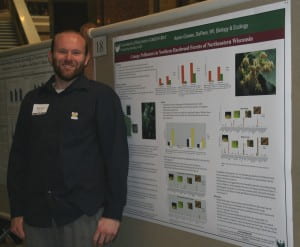
Canopy Pollinators in Northern Hardwood Forests of North Eastern Wisconsin
Abstract: Pollinators visiting Tilia americana were surveyed at two sites in northern Wisconsin. Samples were taken at both ground level and in the canopy in June and July. Flies were the most common insects at both sites and in the canopy and at ground level. Two distinct insect assemblages were identified at both sites.
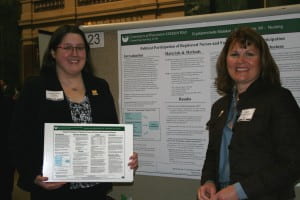
Political Participation of Registered Nurses and Factors Influencing Participation
Abstract: Nursing student (Crystal Malakar) wrote a research proposal to measure factors influencing political participation of RN’s. The Civic Voluntarism Model by Verba and colleagues (1995) guided survey development. Data was collected from 468 RNs using an online survey (Cronbach’s α= .95). Results indicate psychological engagement was most predictive (p = .000) of political participation followed by resources (time/money) (p= .000). Implications for nursing education and nursing organizations are described.
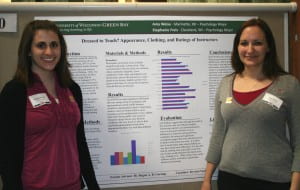
Dressed to Teach? Appearance, Clothing and Ratings of Instructors
Abstract: The purpose of this research project was threefold: 1) Do potentially sexist brands nonconsciously activate stereotype threat and influence performance? 2) Does seeing women wearing potentially sexist brands result in defensive distancing? and 3) Does wearing sexist brands lead to negative perceptions of the wearer? Significant results supported our second and third hypotheses. It is concluded that sexist brands result in an objectification of the wearer and a negative influence on bystanders’ ratings. Also, what impressions are faculty members leaving on their students in regard to their personal dress? Even though dress attire is not one of the teacher evaluation questions that students are asked to assess their professors on, it could have an impact on how students evaluate his or her teaching style.
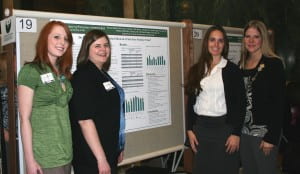
Do Relationships Matter in the Effects of a First Year Seminar Class?
Abstract: Our project evaluated the influence of students’ relationships with instructors and peer mentors on the effectiveness of first year seminar classes at UWGB. Results indicated that stronger relationships in the classroom were related to higher student engagement and more positive perceptions of the seminar experience.

Trusting a Corporate Website versus Corporate Facebook Brand Profile: The Role of Privacy Concern Factors
Abstract: The research examines the impact of privacy concern factors on the users’ trust in company’s websites vs. Facebook brand profiles. The experiment involved 270 students who examined a website and then answered the questions. The data were analyzed using ANOVA. The results show that there are several important differences in the way users trust these websites.
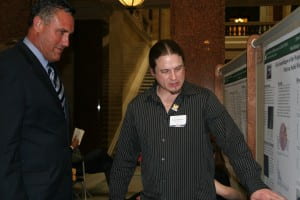
Fish Assemblages of the Wequiock Creek Estuary, Point au Sable Wisconsin
Abstract: The Wequiock Creek Estuary is one of the only sizable estuaries on the east shore of the bay of Green Bay. Surprisingly there have been no prior fish studies done of the area, necessitating a baseline study of the fish assemblages.
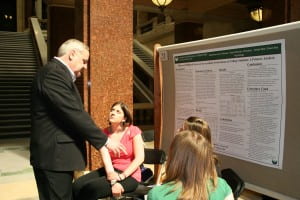
Effects of Childhood Stress on the Academic Performance of College Students
Abstract: Previous research has found stressors to negatively influence academic performance of elementary school students. This investigation shows how financial hardship, poor health, and relationship problems experienced during childhood and adolescence may impact verbal memory performance, reading comprehension and vocabulary scores, as well as grade point average of college students.
Foundation Center Releases Online Mapping Tool
The Foundation Center has released Philanthropy In/Sight, a new interactive mapping tool that examines the impact of philanthropy in the U.S. and worldwide. The tool provides two unique mapping platforms powered by the Foundation Center’s grantmaker and awardee databases.
Users can choose from over 1,100 subject areas and dozens of thematic indicators to assess past funding and current needs in areas such as education, housing, and healthcare at the global, national, state, and local levels.
Webinar: NSF’s New Requirement on Ethical Conduct
November 19, 2009 from 12:00 p.m. to 1:30 p.m. in MAC Hall 137
As of January 2010, the National Science Foundation will require all institutions submitting and receiving NSF funds, at the time of proposal submission, to certify that they have programs in place to promote “responsible and ethical conduct of research to undergraduate students, graduate students, and postdoctoral researchers participating in the proposed research project.”
The Institute for Research is inviting you to attend a short webinar entitled “Interpretation and Implementation of NSF’s Requirement to Facilitate the Ethical Conduct of Research” on November 19, 2009 from 12:00 p.m. to 1:30 p.m. in MAC Hall 137.
The webinar is the initial effort to assist UWGB in its plan to get a good understanding of what type(s) of “training and oversight in the responsible and ethical conduct of research” we need to have in place in order to satisfy this new NSF requirement.
Coordinated by SRA International, the webinar will provide an overview of NSF’s new requirement for institutions receiving NSF funds to provide training and oversight in the responsible and ethical conduct of research. Three speakers with experience in Responsible Conduct of Research (RCR) education will be featured.
If you have recently received NSF funding, submitted a proposal to NSF, or are considering applying for NSF funding in the future, or if you have included Ethics and Conduct of Research in your course curriculum, please consider attending this short but informative session. Please contact Lidia Nonn in the Institute for Research at 465-2565 or nonnl@uwgb.edu. if you have questions about this opportunity.
Interpretation and Implementation of NSF’s Requirement to Facilitate the Ethical Conduct of Research
Instructors:
Peggy L. Fischer
Associate Inspector General for Investigations
Office of Inspector General
National Science Foundation
Dena Plemmons
Coordinator of Research Ethics Initiatives, San Diego State University
Research Ethics Program, University of California, San Diego
Camille Nebeker
Director, Division of Research Affairs
San Diego State University
Overview:
This webinar will provide an overview of NSF’s new requirement for institutions receiving NSF funds to provide training and oversight in the responsible and ethical conduct of research. The three speakers have experience in RCR education from differing perspectives. Peggy Fischer is Associate Inspector General for Investigations at NSF and will provide an insider’s view of the NSF regulation and NSF’s expectations for institutions. Dena Plemmons is adjunct faculty at both SDSU and UCSD, teaches research ethics, and will present resources and approaches to consider as institutions develop their plans. Camille Nebeker is the Director of SDSU’s Division of Research Affairs, is the Organizational Representative responsible for implementing this NSF policy at the institutional level, and will talk about what is being done at SDSU to be responsive.
Regional Workforce Information Available
Demographic information, including educational attainment and economic capacity, is now available on a region-specific basis in a new Lumina Foundation and Census Bureau report. As reported by Inside Higher Ed on August 6, 2009, the Educational Needs Index is a useful tool for proposal writers involved with educational planning and development.
Take Guidance to Agencies as Good News
In an August 4, 2009 memorandum, the Office of Management and Budget and the Office of Science and Technology Policy provided guidance that gives the first clear answer to the grant community’s biggest question of FY 09: What happens after ARRA?
Agency heads are being advised to use the Recovery Act pillars of workforce, energy, healthcare, and competitiveness to build their FY 11 budget requests. Not only the three America COMPETES champions – the National Science Foundation, Department of Energy, and Department of Commerce’s National Institute of Standards and Technology – but also every other federal agency is expected to have the nation’s science, technology, and innovation infrastructure in mind as they execute mid-term strategic plans that continue ARRA momentum.
STEM education, federal compliance, and innovative solutions to pressing needs are the right things to be focusing on now and, if White House guidance is followed, more support for those activities is on its way.
Stimulus (ARRA) Funding for Research Development
In President Obama ‘s speech on research given yesterday at the National Academy of Science, the President offered a series of proposals that are what the research university community and others have long hoped and desired. It could well be a historic speech.
From A Public Voice:
http://www.aplu.org/NetCommunity/Page.aspx?pid=1257
March 3, 2009 – The Federal Stimulus Plan, American Recovery and Reinvestment Act of 2009, contains large increases in Federal support for research, education, job development, infrastructure and many other areas that are important to UWGB. For info, email nonnl@uwgb.edu
June 10, 2009 – The full House Appropriations Committee cleared the asure. Many items are of interest in that they coincide with UW System federal priorities. The bill includes, among other items:
$6.9 billion for the National Science Foundation (NSF), $446 million above the current FY2009 level and $108 billion below the administration request.
$18.2 billion for NASA, $483 million above the current level and$483 million below the request.
$781 million for the National Institute of Standards and Technology (NIST), $57.5 million below FY2009 levels and $65 million below the administration request. Within NIST, the bill would fund the Technology Innovation Program at $70 million.
NOAA would be funded at $4.6 billion, $238 million above the current level and $129 million above the request.
